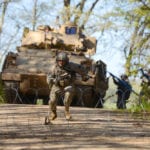For God hath not given us the spirit of fear; but of power, and of love, and of a sound mind. (2 Timothy 1:7, KJV)
Control over our thoughts can have profound consequences in life, especially as it relates to our relationships — with God and with people.
One of the most challenging areas within our thought life pertains to how we deal with fear. Far too many people spend their lives in bondage to fear. Let me cite a few examples.
• Won’t fly in an airplane
• Won’t use elevators
• Won’t drive a car
• Won’t consult a doctor, even though they’re very sick
• Won’t get out of a rut because they’re afraid of failure
• Won’t be themselves
• Won’t exercise or be active
• Won’t go near water — can’t swim
Before going further, know it is normal to have fears. I may not have the same fears you have, but we all have them. Some of our fears are very private, known only to God and ourselves.
That said, the Lord doesn’t want us to remain in bondage to our fears. In fact, Scripture contains hundreds of times when God exhorts us not to be afraid. The verse shown above is just one example. The apostle Paul is writing to encourage a young pastor named Timothy to use his God-given talents in his ministry and not to let fear stop him from fulfilling God’s purposes.
Notice the first part of the verse: “For God hath not given us the spirit of fear.” Paul goes on to say to Timothy, “But of power, and of love, and of a sound mind.”
So how do we deal with our fears? I believe it starts by accurately identifying the fear and admitting that it is a problem.
Second, it is essential to apply the truth of this verse to the situation. The Lord doesn’t want us to live with a spirit of fear. We must believe this truth. A good step may be to pray to God and ask Him to remove the fear or give us the strength and courage to overcome the fear.
Often the third step is an action step. How is the Lord leading you? Frequently, trusting God for answered prayer means we step out in obedience to whatever we believe the Lord wants us to do.
I find it fascinating that God can use anything He chooses to help people overcome their fears. Often it’s another person. Let me cite two examples from my experiences in Vietnam.
I recall a young Specialist in my first infantry platoon. He had less than a week remaining on his tour at the time I joined the platoon. After a day or so at our field location, I noticed that this soldier never left his foxhole. I am not sure he left even to relieve himself.
I mentioned this to my platoon sergeant, an experienced combat veteran. He told me that it was not unusual for soldiers getting near the end of their tour to start becoming more cautious, and even fearful. The fear of being wounded or killed at the end of a combat tour caused some to grow extremely timid.
Most of the time fellow soldiers understood this and made allowances. Sometimes, however, leaders permitted this to go on entirely too much and created morale issues within the unit by choosing not to confront the behavior.
Being new to Vietnam, I took the advice of my platoon sergeant and chose not to intervene. Within a week the soldier was on his way back to the United States. But I did file this incident in my mind for later reference.
Example number two is similar, but not in the outcome. Fast-forward 10 months. I was an infantry platoon leader in another unit. This time, I was the person with the most time in country.
Our battalion was very close to being inactivated and sent back to the U.S. However, we still had a few more weeks of field time remaining. Missions included interdicting enemy supply lines. Search and destroy is a more direct way to describe what we did.
My platoon was operating from a jump firebase. We would send roving patrols during the day and usually deploy one stationary ambush patrol during the hours of darkness. We rotated ambush duty among the squads, with the squad leader designating the individuals who would participate in the ambush. Usually, one or two squad members would remain behind at the firebase.
I began noticing that squad leaders were leaving the same people back each time. Truthfully, they left their less reliable soldiers. If a firefight broke out, they wanted their best men with them. In one sense I could understand that.
But it still bothered me that the same soldiers were being left behind while the others took all the risks. Additionally, the soldiers being left behind were losing confidence in their own capabilities to pull their share of the load.
Finally, I had had enough. These soldiers were going on an ambush patrol, and I was going to lead it. The platoon sergeant and squad leaders thought I was nuts, but went along with the plan.
We spent the day selecting the ambush site and making preparations. Next we rehearsed actions in the event of enemy contact. As daylight rapidly disappeared, we left our secure location and walked to the ambush site. We organized the ambush location, positioning each man in place as we had done in rehearsals.
No one slept. No one talked. We simply watched and listened. It was a long night. The biggest challenge, frankly, turned out to be the mosquitoes.
Finally, the first signs of daylight appeared. Soon our ambush patrol was completed and we walked back to the firebase. As we reentered the wire, I noticed that each member of the patrol seemed to walk a little more upright and with more bounce in his step.
It was obvious that every man in that patrol felt good about what had happened the previous night. Going on the ambush had done much to reduce fear. Taking those soldiers on ambush patrol that night was the right thing to do.
Fear can be a crippling emotion, and it can occur virtually anywhere, anytime. But we don’t have to be helpless victims. The Lord will help us.
Do you have a nagging or even crippling fear in your life? I encourage you to identify it, seek God’s help, and take action to overcome it.








